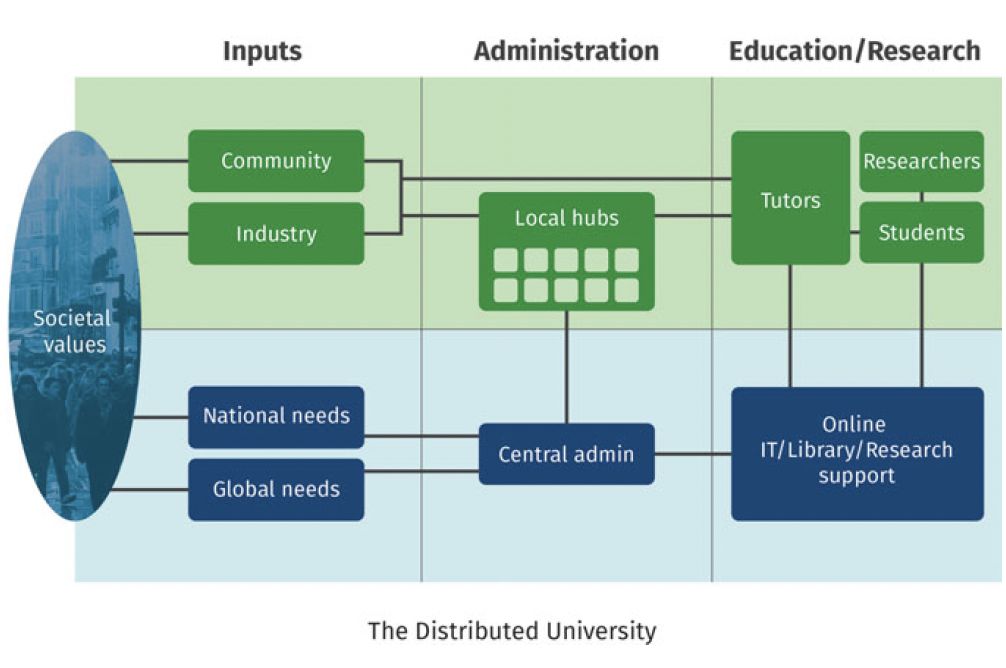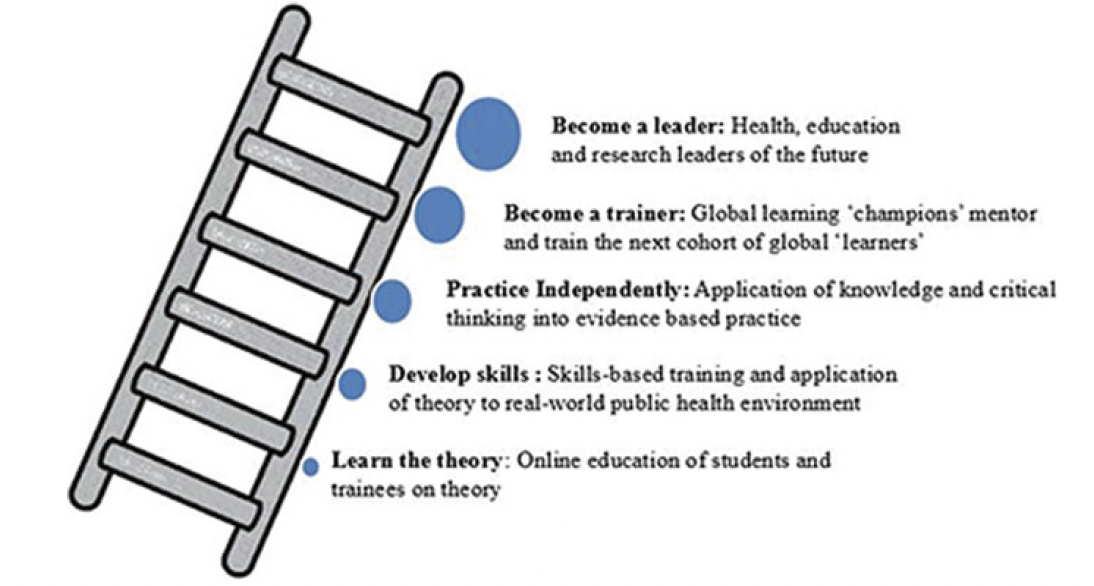
Heller, R. (2022) The Distributed University for Sustainable Higher Education SpringerBriefs in Education: Singapore
Good news: this is an open access book. The second good news is that it is relatively short (80 pages). This means that you can easily access and read it within a day or so (well, the holiday season is approaching). So this review may be a little redundant, but I hope it helps you decide whether it’s worth the effort.
Who is the author?
Richard Heller is a very experienced public health educator and researcher, with experience in teaching health sciences at the Universities of London and Manchester (UK), and at the University of Newcastle in Australia. His teaching experience is wide, including teaching small in-person classes, to developing a fully online Masters in Public Health. On retirement he created Peoples-uni, to help build Public Health capacity in developing countries through volunteer led online education for health professionals at low cost.
The problem with universities today
Heller lays out the following problems with universities today
- His main complaint is that universities have been taken over by administrators and managers, who have changed universities from a community and social focus to universities as businesses, competing for students and income. The focus on managerialism also drains professors of time that could be better spent on teaching and research
- He also argues that though the core function of a university is teaching, research gets priority, torquing the reward system towards research at the expense of teaching.
- Because of the need to generate income, universities now rely too heavily on international students in countries such as Australia and the UK (his arguments apply equally to Canada) with little thought to ethics and building capacity in poorer countries.
- He also argues that universities do not teach in ways that reflect how the young learn today. He is critical of lectures and praises the active learning methods found especially in well-designed online courses.
- Lastly he argues that online learning is more environmentally friendly than face-to-face education: universities need to address more actively the 17 Strategic Development Goals. He references the Higher Education Sustainability Initiative but points out its 5 core areas assume face-to-face education and don’t take account of the potential impact of online learning on the 17 SDGs.
Solutions
He offers the following solutions that would be incorprated into a Distributed University (DU)
- A DU would replace managerialism with trust in academics
- The DU would be based on collaboration rather than competition, particularly through online learning: Technology can build communities of learners that make learning more collaborative, thereby enhancing goal orientation, motivation, persistence and the development of effective learning strategies.
- The DU would work to create with other universities a HE Baccalaureat: a degree program shared across institutions with standardised curriculum/course content using Creative Commons licenses.
- The DU would call on what Heller describes as the Third Sector: volunteer professionals to help with the teaching, either as a public service or ‘loaned’ from organisations.
- The DU would be primarily an online organisation with a small physical footprint of a small administrative centre and local learning hubs
- The DU would place education in a framework of environmental sustainability
Specifics
A Distributed University would focus on the following:
- Local learning hubs linked to a much small central administrative campus
- A focus on lifelong learning, through the provision of a Learning Ladder
- Major use of OER
- A focus on Fourth industrial Revolution technologies such as AI
- Developing a global online learning program to replace reliance on international student fees: Global Learning as “innovative, integrated, global opportunities for capacity building through online learning and shared experiences between and within Low- to Middle-Income Countries and High-Income Countries, in a continuous process that helps health care workers learn as they progress through their careers”
- Plan E: greater free access to materials created by publicly funded HE institutions

How to afford it
The following strategies would be used to manage the costs of a distributed university:
- Separate teaching and research: fund research directly, and do not allow teaching to subsidize research
- Use trust in academics to ensure quality
- Change the educational process to use fully the cost-effectiveness of online learning
Case study: Peoples-uni
Heller ends with a case study of an organisation he created when he retired: the People-uni. This was a low-cost masters program for health professionals in developing countries. There was an academic leader for each course plus 5 volunteer tutors (2 weeks each), 70% students were from Africa, 150 graduated, and there were 400 volunteer tutors from 55 countries. The program had no buildings or offices: everything was done online, also using a large amount of OER. The program closed in 2021, after 15 years.
My comments
If you feel any sort of unease about the current higher education system in your country, I strongly recommend you read this book. It is full of good ideas and presents a scathing analysis of the problems with universities in particular today. I found myself at many points nodding in agreement with the author, especially with regard to the scandal of international student fees being used to subsidise institutions in economically advanced countries. Heller offers a much more ethical and reasonable approach to the education of students in lower income countries. We do need better models of collaboration between institutions in economically advanced countries and those in low income countries, and a distributed learning model could be an important element im such a relationship.
I also agree that we need to look much more critically at how higher education could be offered more sustainably and more ethically, and that online learning has a critical role to play in reducing the environmental impact of higher education.
However, although I sympathise with Heller, particularly his disgust with the increased emphasis on the business-like management of universities and the priority of research over teaching, I have some doubts about some of his solutions.
In particular, the financial chapter (How to afford it) is very weak. I have a problem in just trusting academics to do the right thing. It is they, after all, who drive the focus on research. It is not just the reward system (although that does not help). Most academics are subject experts and research is their prime interest. I suspect if we left administration solely to academics, teaching would suffer even more. In any case, most administrators are also academic. Heller himself points out that they are not trained as managers. But I agree that we need better models of management for universities that are less bureaucratic and focused as a much if not more on the teaching and learning needs of students. Better use could be made of digital technologies to facilitate institutional decision-making, but in the end, we need better ways to involve and train academics in decision-making.
Lastly, although I do agree that, overall, online learning can lead to efficiencies and lower environmental costs, online learning too has a significant carbon footprint, through the energy and servers that it uses. What we lack are really sound cost-benefit studies regarding the environmental impact of online learning, as well as similar studies on the environmental impact of campus-based learning.
Despite these reservations, I do strongly recommend this book. There are many good ideas in it.









 Dr. Tony Bates is the author of eleven books in the field of online learning and distance education. He has provided consulting services specializing in training in the planning and management of online learning and distance education, working with over 40 organizations in 25 countries. Tony is a Research Associate with Contact North | Contact Nord, Ontario’s Distance Education & Training Network.
Dr. Tony Bates is the author of eleven books in the field of online learning and distance education. He has provided consulting services specializing in training in the planning and management of online learning and distance education, working with over 40 organizations in 25 countries. Tony is a Research Associate with Contact North | Contact Nord, Ontario’s Distance Education & Training Network.

